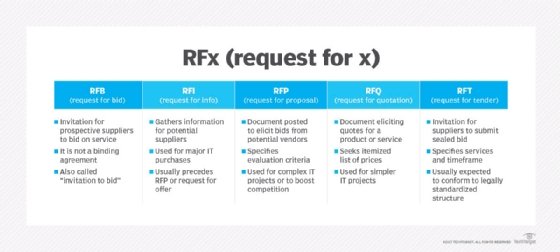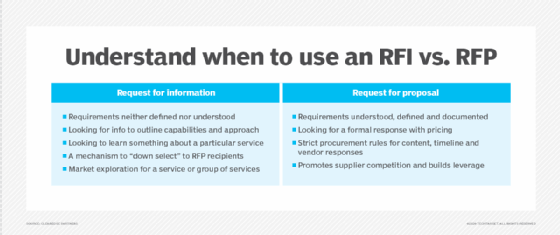request for proposal (RFP)
What is a request for proposal (RFP)?
A request for proposal (RFP) is a document that an organization, often a government agency or large enterprise, posts to elicit a response -- a formal bid -- from potential vendors for a desired IT solution. The RFP specifies what the customer is looking for and describes each evaluation criterion on which a vendor's proposal will be assessed.
What does an RFP include?
An RFP generally includes background on the issuing organization and its lines of business (LOBs), a set of specifications that describe the sought-after solution and evaluation criteria that disclose how proposals will be graded.
The RFP typically contains a section, sometimes called a statement of work (SOW), defining the scope of work or the scope of service(s) to be provided. This section discusses the tasks to be performed by the winning bidder and a timeline for providing deliverables.
The request for proposal also includes guidance to bidders on how to prepare a proposal. This section will provide the details on the proposal format, as well as instructions on how the RFP response is to be constructed and organized.
When writing an RFP and SOW, it is important to be mindful of organizational processes and best practices, to maximize effectiveness.

Why are RFPs important and who uses them?
An RFP may be issued for a number of reasons.
In some cases, the complexity of an IT project calls for a formal RFP. An organization can benefit from multiple bidders and perspectives when seeking an integrated solution calling for a mix of technologies, vendors and potential configurations. A business moving from a paper-based system to a computer-based system, for example, might request proposals for all the hardware, software and user training required to establish and integrate the new system into the organization. A simple hardware upgrade, in contrast, may only involve issuing a request for quotation (RFQ) to a single vendor.
Some entities, such as government agencies, may be required to issue RFPs to provide full and open competition.
An organization may also release an RFP to boost competition to drive down the cost of a solution. That said, a proposal accepted on the basis of being the most responsive to an RFP's specifications may not always be the lowest-priced bid. As many companies will be competing for business with the company issuing an RFP, it is important for vendors to craft winning RFP responses.
The skill with which a customer creates an RFP can dictate the quality of a bidder's response and, therefore, success or failure of the resulting IT solution. If the specified requirements are too vague, a bidder may miss the mark when it designs and implements the solution. Overly detailed and restrictive requirements, however, limit the bidder's creativity and stifle innovation. It's important for companies to set clear expectations with vendors in order to receive a quality response.
Request for proposal process
The RFP process may start with a draft RFP; bidders review the draft solicitation document and submit suggestions for improvement. The organization issuing an RFP may also invite prospective bidders to a pre-bid conference so they can ask questions about the solicitation document and learn more about the project.
The final RFP, reflecting feedback received during the draft stage, is then issued and bidders submit proposals. The customer may down-select bidders to a smaller group and enter negotiations on pricing and technical details. The customer may then invite the remaining bidders to submit a best and final offer in preparation to award a contract.
RFP vs. RFI
Though RFP and request for information (RFI) sound similar and can be confused, they represent very different milestones in the vendor bidding timeline.
A company issues an RFP to potential vendors when it has already specified clear-cut requirements for the vendor. An RFI is used earlier on in the cycle, when the issuing company is initially entertaining possible solutions.








